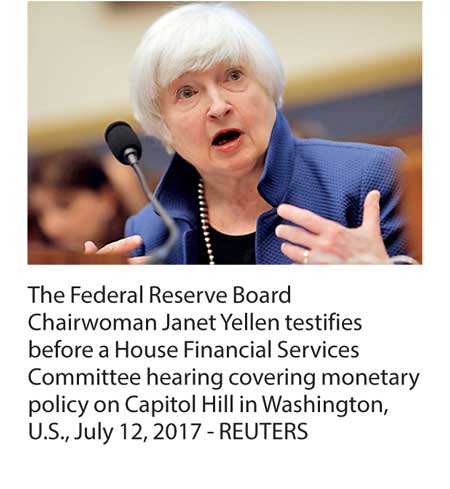Wednesday Feb 25, 2026
Wednesday Feb 25, 2026
Friday, 14 July 2017 00:00 - - {{hitsCtrl.values.hits}}
 WASHINGTON (Reuters): The US economy is healthy enough for the Fed to proceed with plans to raise rates and begin winding down its massive bond portfolio, though low inflation and a low neutral rate may leave the central bank with diminished leeway, Fed Chair Janet Yellen said on Wednesday.
WASHINGTON (Reuters): The US economy is healthy enough for the Fed to proceed with plans to raise rates and begin winding down its massive bond portfolio, though low inflation and a low neutral rate may leave the central bank with diminished leeway, Fed Chair Janet Yellen said on Wednesday.
In what may be one of her last appearances before Congress, Yellen depicted an economy that, while growing slowly, continued to add jobs, benefited from steady household consumption and a recent jump in business investment, and was now being supported by stronger economic conditions abroad.
The Fed “continues to expect that the evolution of the economy will warrant gradual increases in the federal funds rate over time,” Yellen said in her prepared testimony. Reductions in the Fed’s portfolio of more than $4 trillion in securities are likely to begin “this year,” she said.
But she also noted that given current estimates, the federal funds rate “would not have to rise all that much further” to reach a neutral level that neither encourages nor discourages economic activity. The Fed still feels the economy needs loose, or accommodative, monetary policy, so a lower neutral rate means the Fed may feel compelled to slow the pace of rate hikes down the road.
But for now, Yellen told members of the House Committee on Financial Services that the economy remains strong enough for the Fed to continue its plans to gradually tighten policy. In response to questions from lawmakers, she said she expects the gradual run down of the balance sheet will “play out smoothly” in markets. Her appearance, coming as the Trump administration mulls whether to replace her when her term ends in February, broke little new ground in terms of policy or regulatory changes.
“We have a relatively light regulatory agenda at this point,” Yellen said. She confirmed the Fed was reviewing some of the requirements imposed on bank boards of directors following the financial crisis, with any eye towards possibly easing some of them.
She also repeated the Fed’s strong opposition to proposals that policymakers worry could give elected officials influence over what are supposed to be independent Fed interest rate decisions.
According to her testimony the economy is on an even keel, near or beyond full employment. The reduction in the balance sheet, which will begin slowly as the Fed reinvests only a portion of the holdings that mature each month, will mark the final exit from crisis-related policies.